Timothy Geithner — while heading up the New York Fed in 2008 — left upwards of $13 billion of taxpayer money on the table to the likes of Goldman Sachs, Merrill Lynch and Deutsche Bank during negotiations over payment of AIG’s credit default swaps because “some counterparties insisted on being paid in full” and Geithner “did not want to negotiate separate deals.”
As regular readers of this blog know, I thought the federal bailout of AIG and various other Wall Street firms was a bad idea from the start because it prevented our insolvency and reorganization system from allocating the risk of loss among the creditors of the financially-troubled firms.
Nevertheless, after various political forces stoked a climate of fear, Congress approved broad bailout legislation even though it was clear at the time that few of the legislators understood what they were approving.
Not surprisingly, various large creditors of the financially-troubled firms did very well for themselves under the bailout legislation. Can’t blame them for protecting their shareholders’ interests, now can you?
But really. Geithner got fleeced for billions in regard to AIG’s bailout by investment banks that had no negotiating leverage whatsoever. What were the banks going to do if Geithner had demanded that they take a discounted amount? Risk a global financial meltdown by demanding that the Fed pay AIG’s CDS’s at par?
Geithner let them get away with it. And now he is out Treasury Secretary.

